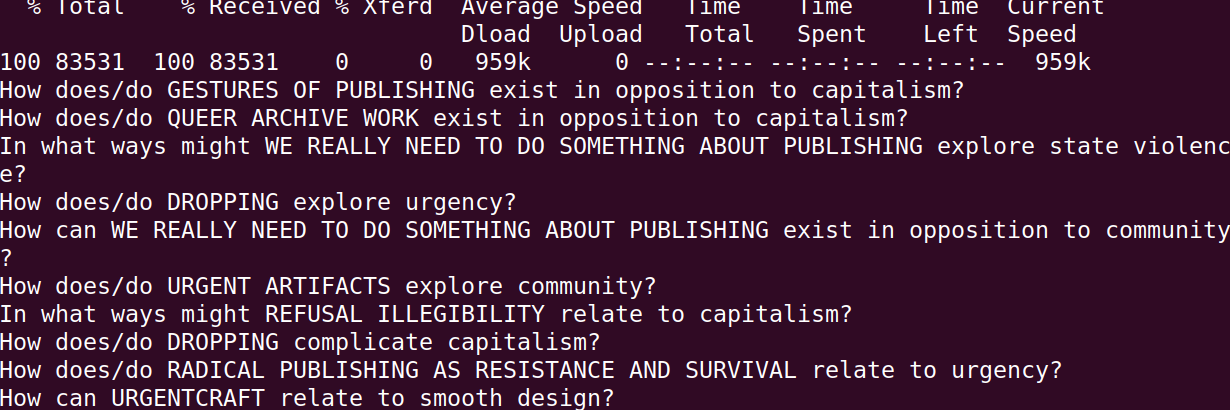An URGENTCRAFT discussion question generator + some of my own thoughts

Since I'm helping lead discussion in Scrapism this week, I made a little cut-up question generator for URGENTCRAFT, figuring I'd kill two birds with one stone. This is somewhat inspired by Kate Compton's Tracery. Any suggestions for tweaks to the sentence generation are welcome, I got pretty caught up trying to make the bash script perfect and didn't spend as much time on parts of speech as I'd like. Its output may not be the best way to start a discussion, so I've added some of my own thoughts and questions below.
Code:
#remove all html tags, pull any lines with question marks
#this was my first pass at pulling questions directly from the text but it seemed too lazy
#curl 'https://soulellis.com/writing/post-documenta/index.html' | sed 's/<[^>]\+>/ /g' | grep -P '(?<=[.?!]\s)[A-Z][^"]*("[^"]+")?[^".?!]*[?]'
start=("How can", "How does/do", "In what ways might", "Do you think")
verb=("exist in opposition to", "relate to", "explore", "complicate", "be used to subvert", "create", "resemble", "undercut", "cause", "contribute to")
noun=("capitalism", "anticapitalism", "smooth design", "urgency", "community", "state violence", "social media", "the feed", "the superstructure", "interface dematerialization")
echo "${start}"
# pull text from URGENTCRAFT, filter so it's only h2 text, add semicolon delimiter, then remove html text and integers
# i am sure there is a single RegEx that can do this instead of four different ones but i am only one man
text=$(curl https://soulellis.com/writing/post-documenta/index.html | grep -E "<h2.*>(.*?)</h2>" | sed 's/<\/h2>/;/g' | sed 's/<[^>]\+>/ /g' | sed 's/[0-9]*//g' | sed 's/,//g')
# turn text into array delimited by semicolon
IFS=$';'
textArr=(${text//$'\n'/ })
counter=1
# while loop to generate random questions from word arrays and section titles
while [ $counter -le 10 ]
do
# generate random indices for each array
randStart=$[$RANDOM % ${#start[@]}]
randVerb=$[$RANDOM % ${#verb[@]}]
randNoun=$[$RANDOM % ${#noun[@]}]
randTopic=$[$RANDOM % ${#textArr[@]}]
# get words using random indices
# make and display each question
# tried printing all the variables together but couldn't make it work for some reason
output=${start[$randStart]}
output+=${textArr[$randTopic]}
output+=" "
output+=${verb[$randVerb]}
output+=" "
output+=${noun[$randNoun]}
output+="?"
# print output, trimming duplicate whitespace and commas
echo $( echo $output | sed 's/ */ /g' | sed 's/,//g')
# increment while loop counter
counter=$(($counter + 1))
done
Some Fun Generated Questions:
- In what ways might POSTING complicate community?
- How can URGENT ARTIFACTS complicate capitalism?
- In what ways might DROPPING explore state violence?
Some Of My Actual Human Thoughts
- WWWBT (what would Walter Benjamin think)
- The reading talks about about publishing as an act of narrative creation, one that can oppress as well as empower. There's an argument to be made that telling a story that involves real people will always be an act of violence, reducing someone's reality into lower dimensions. Are there acts of political narrative creation that are nonviolent? If not, when is that violence acceptable?
- Is this just a master's tools, master's house problem?
- In a similar vein, "forced publishing", e.g. flyering the victims of a war of invasion, seems to have plenty of analogues in the contemporary "feed". What are some examples of forced publishing in the digital sphere, and when is an act of forced publishing acceptable? For example, are amber alerts an acceptable use of force?
- There's probably something here about how a software stack relates to a stack of books but I'm not smart enough to tease it out.
- How do folks feel about resisting smoothness? Personally, I'm curious about how deep this practice goes, especially for designers. There have been a variety of design movements (I'm thinking digital gardening and UX brutalism) that attempt to push against the drop-shadowed seamlessness of the contemporary digital experience, but don't necessarily hold up to closer inspection. Are you really "resisting smoothness" if you're using GitHub pages to publish your website, or Google Cloud and Adobe products to make your artistic statement? How close to the metal do we have to get to understand the politics of our platforms?
- Radical spaces are still at risk of falling into some of the neo-liberal values the author condemns. These spaces can create an in-group, start to operate "self-sufficiently", and ultimately reinforce a sense of capitalist fracture and tribalism by defining themselves in relation or opposition to an "other". How can these spaces create solidarity, or meet people where they are? Should they?
- How do you prevent radical movements from turning into Lockheed Martin at Pride, or "hire more women guards"? I worry that interference, interruption, agitation, visibility are a set of four steps, at the end of which the movement is subsumed back into capitalism.
- Which of the rules or manifesto points in Section 18 speak to you? Which don't?
- I would like to steal from institutions more.
- Looking back at all these they seem mostly negative, and I fear that I've been conditioned to seek out hypocrisy and potential points of failure, so to end on a positive note: what (from the reading or outside of it) gives people hope of escaping capitalism? How can art and design "loosen power"?
Citations
(i lost track of how many stackoverflow tabs i had open but i think this is most of the stuff i used)
- https://stackoverflow.com/questions/32696871/how-to-concat-variable-and-string-in-bash-script
- https://www.cyberciti.biz/faq/bash-while-loop/
- https://unix.stackexchange.com/questions/163810/grep-on-a-variable
- https://unix.stackexchange.com/questions/673896/grep-for-consecutive-words-with-capital-letters
- https://stackoverflow.com/questions/19771965/split-bash-string-by-newline-characters
- https://www.cyberciti.biz/faq/sed-remove-all-digits-input-from-input/
- https://unix.stackexchange.com/questions/19014/how-to-strip-multiple-spaces-to-one-using-sed